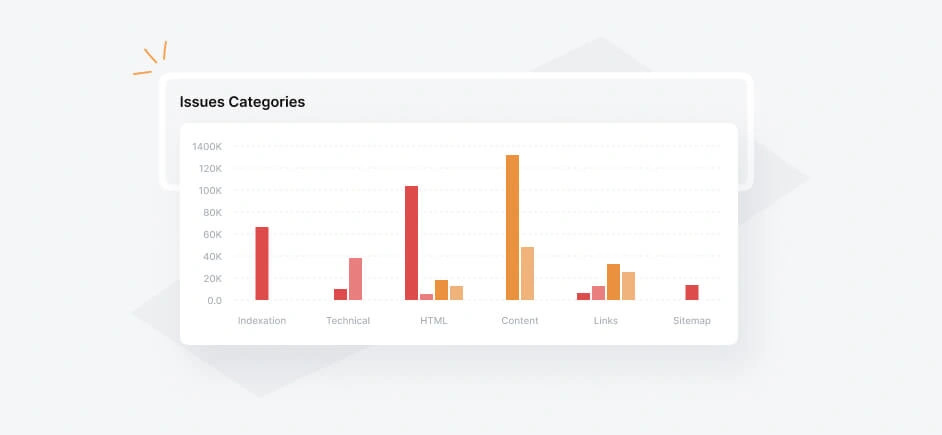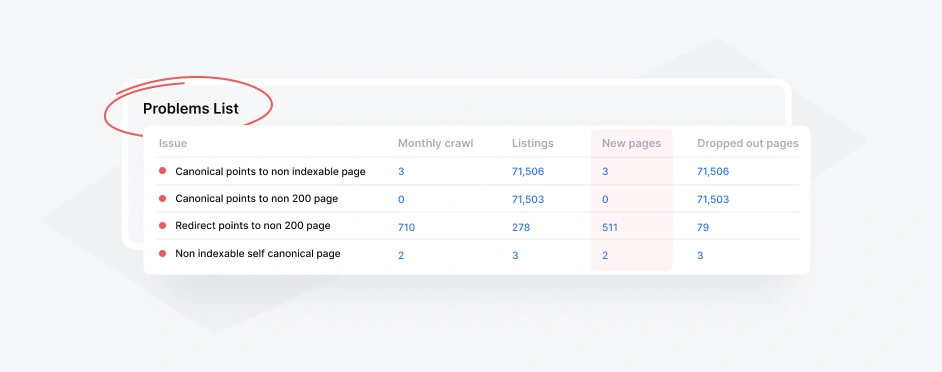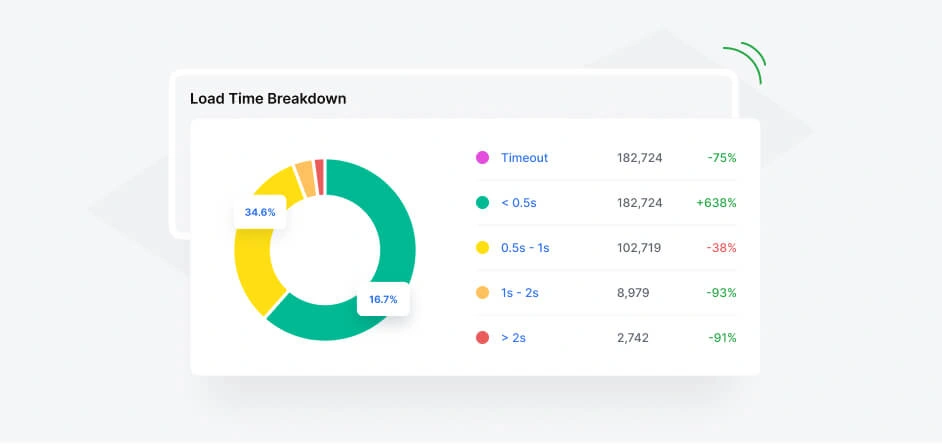Travel Marketplace with more than 300.000 pages
- Period of collaboration
- March 2022 - Present
- Client’s location
- United States of America


Challenges
- Monitoring and fixing technical issues
- Duplicate Content and Poor Site Structure
- Lack of Clarity on Total Page Count and Indexability
Favorite JetOctopus Tools:
- Crawler, Duplicates & Internal Links Tools
- SEO Problems List by Priority
- Indexability Issues:
Canonical Tag Errors Identification
Challenges
- Monitoring and fixing technical issues
- Duplicate Content and Poor Site Structure
- Lack of Clarity on Total Page Count and Indexability
Favorite JetOctopus Tools:
- Crawler, Duplicates & Internal Links Tools
- SEO Problems List by Priority
- Indexability Issues:
Canonical Tag Errors Identification
Details
Feedback
JetOctopus has been instrumental in elevating our site's SEO. From detecting duplicate content to optimizing internal links, we've seen transformative changes. Our keyword rankings soared by 250% and we saw a staggering 20% increase in traffic within a year! Grateful for this collaboration!
Customer Case Study: How Travel Project Increased Traffic by 20% with JetOctopus
Highlights of the case:
- How the client decreased the pages with criticial issues by 83%?
- How client's team increased the number of indexable pages by remarkable 800%?
- How they enriched the website to 63 million internal links and what it led to?
- How they eliminated 100.000 totally duplicated pages which had a really negative impact on Site Indexability?
Introduction
In this case study, we explore the success story of a travel website in a specific niche. This project is a unique travel website that offers journeys to breathtaking destinations while connecting like-minded individuals around the world. The distinguishing feature of this website lies in its lack of a specific localization. While the site is in English, it caters to users from various countries worldwide, including the United States, Great Britain, and numerous European and Asian countries. This broadens the scope of its niche audience, while simultaneously presenting fresh challenges for SEO optimization. To enhance SEO traffic and draw high-quality customers, the company started collaborating with JetOctopus and already increased traffic by 20% in 1 year of collaboration.
- SEO traffic increased by more than 20%.
- Keyword rankings jumped by 250%.
- The number of clicks and impressions increased by more than 100%.
- Google accelerated the site's indexing.
Challenges before the start of collaboration
Before collaborating with JetOctopus, the travel website faced significant challenges, as:
- The team lacked a clear understanding of the website's total page count, which hindered their ability to assess Google's crawling efficiency.
- They want to identify high-performing pages and resolve issues with duplicate content.
Upon conducting an initial website crawl using JetOctopus, it was revealed that the website contained over a million pages, but only a third of them were indexable and able to contribute to search engine result page (SERP) rankings.
Start of Collaboration
Before using JetOctopus, the project team leveraged Ahrefs for SEO tasks and sometimes used desktop SEO-crawlers. To foster organic traffic growth and obtain detailed insights from a full-scale analysis, not just partial crawls, they switched to JetOctopus. The travel project's founder emphasized their move was driven by the need to precisely analyze their extensive website which contains between 300,000 to potentially millions of pages.
"We aimed for a tool that could grant us comprehensive insights through full crawl data analysis"
Travel Project team noted, underlining the critical role JetOctopus now plays in their SEO strategy.
The technical SEO audit proved to be immensely beneficial in kickstarting the project's data analysis journey. It provided a comprehensive understanding of the platform's capabilities and how to leverage the platform data effectively. The founders of the project wholeheartedly agree that the audit played a crucial role in identifying and resolving technical issues that had been plaguing the website. The travel project and JetOctopus teams now follow a streamlined work process, routinely conducting website crawls and technical SEO audits to improve SEO traffic efficiently.
Strategy and Execution:
- The first problem was the discovery of numerous duplicate pages during the website crawl.
- The second issue that hindered efficient crawling and indexing of the website was related to sitemaps.
- Firstly, broken links were found in the sitemaps.
- Secondly, several thousand orphan pages were identified after scanning.
- Thirdly, not all indexable pages were included in the sitemaps.
- The last problem was particularly relevant as it was related to internal linking issues on the website. This meant that many pages only had 1-2 internal links pointing to them, making it difficult for search engines to detect and scan these pages.
Consequently, important pages with weak internal linking might not have received the attention they deserved, leading to potentially worse results in SERPs. Additionally, pages with weak internal linking were less likely to be found by users.
By precisely applying technical SEO optimization strategies and methodically resolving critical site issues, the Travel client victoriously amplified its SEO channel traffic by an impressive 20% within the short term of one year. This case serves as a strong testament to the powerful potential of a data-driven approach in the realm of SEO optimization, demonstrating how such collaboration can unearth and leverage opportunities for comprehensive site improvement and substantial traffic growth.
Crawlability Issues and Solutions
Adding all indexable pages to sitemaps partially resolved the problem of search engines rarely crawling important pages. The next steps involved optimizing the internal links. Below is a screenshot demonstrating On-page SEO optimizations in dynamics.
The columns on the right display the problems found during the first crawl of the website, while the columns on the left show issues identified in the last crawl (one year after the start of the collaboration). Some of the most crucial issues that were successfully resolved include content, sitemap, and HTML problems.

What were the specific changes in the website's metrics from the initial full crawl to the most recent one?
- The number of pages with critical technical issues decreased by 83%.
- The number of indexable pages with traffic potential increased by a remarkable 800%.
- The travel project team made significant improvements in load times, with the number of pages loading in under 0.5 seconds - load time improved for 68%.
- One noteworthy achievement for the travel project team is the substantial increase in the number of internal links with clear and useful anchor text, which saw a remarkable growth of 787%! The total number of internal links now exceeds 63 million. This robust internal linking strategy had a positive impact on the site's performance in Google. It led to increased page scanning frequency, the discovery of more indexable pages (including some previously orphaned ones), and ultimately, an expansion in the number of active pages in the SERP.
- Additionally, the chart illustrates improvements in the content section. The number of pages with non-unique content dropped from 117,000 to 40,000 pages, and efforts to enhance unique content are ongoing.
- Previously, there were nearly 100,000 pages with full HTML duplication, meaning they were identical both in text and HTML code. These duplicates have been entirely eliminated by the travel project team.
Further, we will discuss the challenges related to indexing.
Indexation Issues and Canonical Tag Errors
In addition to crawlability issues, the website faced challenges with the indexability of pages during the crawling process. Many of these issues were related to errors in canonical tags. JetOctopus proved invaluable in identifying these problems, as manual identification for large websites becomes impractical. Such issues prevented affected pages from being indexed or ranking high in the SERP.
For large websites, manually identifying all problems with canonical tags becomes impractical. Consequently, it's possible to unknowingly use canonicals that point to non-indexable pages or pages returning a non-200 status code. Unfortunately, such issues were present on the travel website. Although the number of affected pages was relatively small compared to the total number of pages on the website, pages with these incorrect canonicals had no chance of being indexed or ranking high in the SERP.

Mobile Friendliness and Performance Concerns
One of the key advantages of JetOctopus is its ability to conduct multiple checks in one place, enabling the identification of the correlation between technical problems and the website's performance in the SERP.
The travel website encountered certain mobile friendliness issues that affected the rendering of pages by Googlebot. Additionally, there were load time problems, which could have a negative impact on the crawl budget. Because, in addition to the number of pages and their size, their speed is also of great importance. As you see, faster page response time allow Googlebot to crawl more pages efficiently and more often.

Achieved Results:
In just one year of cooperation with JetOctopus, our travel client witnessed a dynamic SEO transformation. Key metrics grew exponentially, demonstrating the effectiveness and value of our platform and joint collaboration:
- SEO traffic increased by more than 20%.
- Keyword rankings jumped by 250%.
- The number of clicks and impressions increased by more than 100%.
- Google accelerated the site's indexing.
Conclusions:
The path that JetOctopus and the team of the Travel client are currently going through shows the main points of high-quality SEO optimization.
It is important to develop a strategy based on accurate data, not hypotheses, and to properly prioritize actions to optimize and increase search engine results.
